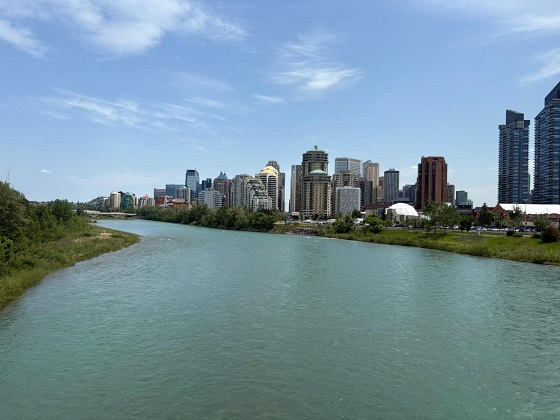Education
Red Deer Public Schools Mental Health Pilot Program now permanently supporting kids and families in crisis

Behaviour Support Team building capacity across Red Deer Public
Red Deer Public’s Behaviour Support Team has continued to make a positive difference throughout the Division as they help develop mental health strategies for students and help support teachers.
In the fall of 2022, the Division received a $706,000 grant through the Mental Health In Schools Pilot Program from Alberta Education. From this grant, a three person Behaviour Support Team was formed, which includes a registered psychiatric nurse, a teacher with additional training in supporting mental health and behaviour, and a social worker. This centralized team travels to schools throughout the Division as needed to help support students, staff and families.
Since December 2022, the team of three has made over 360 school team or teacher visits regarding an individual student, four classroom group consultations, 19 school-based professional development sessions, four Division teacher training sessions, and one Vice Principal training session.
“Once developed, the team was immediately available to classrooms to respond in a timely fashion to a crisis situation in school. They can help de-escalate the situation while maintaining the safety and dignity of the student and allowing the classroom teacher to return to teaching,” said Nicola Golby, Associate Superintendent of Student Services. “This has also led to less disturbance in the classroom and maintains regulation of other students.”
Recently, the Behaviour Support Team has been collaborating with the newly created Red Deer Youth Stabilization Team (CAST – Child and Adolescent Stabilization Team) with Alberta Health Services. CAST has both been a pathway to psychiatry and community resources with the goal of avoiding an emergency room visit.
“The team has met with AHS members and the CAST team to facilitate ease of access for families reaching a crisis point,” said Golby. “This wrap-around approach has been successful for families that were feeling a sense of hopelessness or desperation for high-level supports.”
Meanwhile, the Behaviour Support Team has been building capacity throughout Red Deer Public in two main ways. Firstly, they work with Learning Teams (Teachers, Educational Assistants, Administrators and Principals) with a focus on identifying proactive supports and strategies to build capacity in the school team.
“As a large part of their work, the team will go in a teacher’s classroom to model and trial strategies side-by-side with the teacher,” said Golby. “One piece is to build skills with the teacher and/or school in order to target dysregulation and diminish the resulting anxiety in other students within the class.”
The second way the team has been building capacity is through group professional development.
“Red Deer Public began implementing Student Support Rooms in our elementary and middle schools in fall of 2023. These rooms are part of a strategy to have a place for students to go when they need to regulate their emotions, display big behaviours, or to connect with an adult while maintaining dignity in a more private space,” said Golby. “The Behaviour Support Team has been training the 18 Student Support Room teachers, primarily using Bruce Perry’s Neurosequential Model of Education, Gordon Neufeld emotional playgrounds, and Martin Brokenleg’s Circle of Courage. This professional development has been a great way to collaborate and support our teachers.”
Moving forward, the team will continue to provide support where needed throughout Red Deer Public Schools, while building the capacity of staff, students and families.
Alberta
Schools should go back to basics to mitigate effects of AI

From the Fraser Institute
Odds are, you can’t tell whether this sentence was written by AI. Schools across Canada face the same problem. And happily, some are finding simple solutions.
Manitoba’s Division Scolaire Franco-Manitobaine recently issued new guidelines for teachers, to only assign optional homework and reading in grades Kindergarten to six, and limit homework in grades seven to 12. The reason? The proliferation of generative artificial intelligence (AI) chatbots such as ChatGPT make it very difficult for teachers, juggling a heavy workload, to discern genuine student work from AI-generated text. In fact, according to Division superintendent Alain Laberge, “Most of the [after-school assignment] submissions, we find, are coming from AI, to be quite honest.”
This problem isn’t limited to Manitoba, of course.
Two provincial doors down, in Alberta, new data analysis revealed that high school report card grades are rising while scores on provincewide assessments are not—particularly since 2022, the year ChatGPT was released. Report cards account for take-home work, while standardized tests are written in person, in the presence of teaching staff.
Specifically, from 2016 to 2019, the average standardized test score in Alberta across a range of subjects was 64 while the report card grade was 73.3—or 9.3 percentage points higher). From 2022 and 2024, the gap increased to 12.5 percentage points. (Data for 2020 and 2021 are unavailable due to COVID school closures.)
In lieu of take-home work, the Division Scolaire Franco-Manitobaine recommends nightly reading for students, which is a great idea. Having students read nightly doesn’t cost schools a dime but it’s strongly associated with improving academic outcomes.
According to a Programme for International Student Assessment (PISA) analysis of 174,000 student scores across 32 countries, the connection between daily reading and literacy was “moderately strong and meaningful,” and reading engagement affects reading achievement more than the socioeconomic status, gender or family structure of students.
All of this points to an undeniable shift in education—that is, teachers are losing a once-valuable tool (homework) and shifting more work back into the classroom. And while new technologies will continue to change the education landscape in heretofore unknown ways, one time-tested winning strategy is to go back to basics.
And some of “the basics” have slipped rapidly away. Some college students in elite universities arrive on campus never having read an entire book. Many university professors bemoan the newfound inability of students to write essays or deconstruct basic story components. Canada’s average PISA scores—a test of 15-year-olds in math, reading and science—have plummeted. In math, student test scores have dropped 35 points—the PISA equivalent of nearly two years of lost learning—in the last two decades. In reading, students have fallen about one year behind while science scores dropped moderately.
The decline in Canadian student achievement predates the widespread access of generative AI, but AI complicates the problem. Again, the solution needn’t be costly or complicated. There’s a reason why many tech CEOs famously send their children to screen-free schools. If technology is too tempting, in or outside of class, students should write with a pencil and paper. If ChatGPT is too hard to detect (and we know it is, because even AI often can’t accurately detect AI), in-class essays and assignments make sense.
And crucially, standardized tests provide the most reliable equitable measure of student progress, and if properly monitored, they’re AI-proof. Yet standardized testing is on the wane in Canada, thanks to long-standing attacks from teacher unions and other opponents, and despite broad support from parents. Now more than ever, parents and educators require reliable data to access the ability of students. Standardized testing varies widely among the provinces, but parents in every province should demand a strong standardized testing regime.
AI may be here to stay and it may play a large role in the future of education. But if schools deprive students of the ability to read books, structure clear sentences, correspond organically with other humans and complete their own work, they will do students no favours. The best way to ensure kids are “future ready”—to borrow a phrase oft-used to justify seesawing educational tech trends—is to school them in the basics.
Business
Why Does Canada “Lead” the World in Funding Racist Indoctrination?
-

 Uncategorized1 day ago
Uncategorized1 day agoMortgaging Canada’s energy future — the hidden costs of the Carney-Smith pipeline deal
-

 Business2 days ago
Business2 days agoThere’s No Bias at CBC News, You Say? Well, OK…
-

 International1 day ago
International1 day agoAustralian PM booed at Bondi vigil as crowd screams “shame!”
-

 Opinion2 days ago
Opinion2 days agoReligion on trial: what could happen if Canada passes its new hate speech legislation
-

 Automotive24 hours ago
Automotive24 hours agoCanada’s EV gamble is starting to backfire
-

 Agriculture21 hours ago
Agriculture21 hours agoEnd Supply Management—For the Sake of Canadian Consumers
-

 Alberta20 hours ago
Alberta20 hours agoAlberta Next Panel calls to reform how Canada works
-

 Environment18 hours ago
Environment18 hours agoCanada’s river water quality strong overall although some localized issues persist















